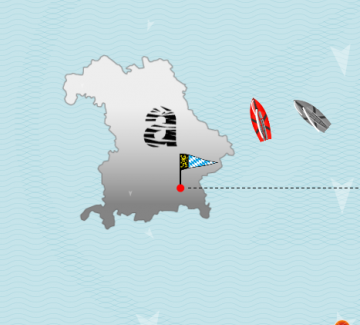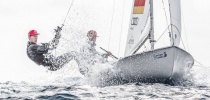What is your aim?
"Our aim is to compete in the 470 class at the 2016 Olympic Games in Rio de Janeiro. It goes without saying that we are looking to be genuine medal contenders."
How are you preparing to achieve this aim?
"We train in the boat for 150 days a year. We prepare for upcoming competition and we match our skills against international training partners. We are seeking to improve our sailing in both technical and tactical terms on an ongoing basis in order to become genuine contenders at a national and international level as quickly as possible. Our daily programme also, of course, includes extensive fitness work and coordination and mental training. Top-level sailing is a real full-time job. The high degree of complexity involved in the sport is one of the major reasons for this."
What makes sailing the most complex sport in the world?
"Sailing is affected by many variables, and this is what makes the sport so complex. These variables include the boat, the wind, the weather, the water and, of course, the human factor. There are very few sports which involve so many factors which are subject to constant change. These factors dictate success or failure. Many people believe that sailing is simply a question of sitting in a boat and allowing the wind to propel you along. The fact is, however, that only weekend sailors operate in this way."
How important is it to have the right tactics when taking part in a competition?
"Very important. The best tactics and strategy are the crucial factors. The boats and the external conditions are more or less the same for everyone. The winners will be those who make the best use of tactics and strategy. The trick is to take extremely precise notice of wind and weather conditions. You also need to observe any changes in the wind ahead of your opponents and use these to your own advantage. This involves continually changing positions on the boat and making quick decisions. Many things happen on board, and they happen at the same time."
Are the same skills involved when there is a lot of wind and when there is not much wind?
"When wind speeds are low, athletes taking part in top-level competitive regattas in the 420 or 470 class need to remain calm and bring their powers of concentration to bear. By the same token, they need to display their strength and stamina when conditions are windy. If there is not much wind, athletes try to move around on the boat as little as possible and be as subtle as possible in the movements they do make. If the wind is stronger, the aim is to sail the boat in a precisely upright position in order to enter the planing phase as quickly as possible."
How are tasks divided up between the skipper and the crew?
"It is important to achieve harmony on the boat. The primary responsibility of the skipper is to steer the boat quickly through the wind and water conditions. Further tasks for the skipper include setting the main sail in the best possible way and shifting his weight to ensure that the boat is making the best use of the wind. The crew needs to make sure that the foresail and spinnaker are correctly trimmed and also provides the skipper with ongoing and valuable information on any changes in the wind and in the position of the respective opponents. Both crew members work together on tactics and both are therefore responsible for ensuring that the boat reaches the fastest possible speed. Other factors are, however, also crucial. These include land training for competition series and studying the venue and weather conditions."
What skills does a professional sailor need?
"A combination of quite a few things. The main tools of the sailor are technical skills, tactics and strategy. He also needs to have a good feeling for wind conditions and water, of course. Strength, stamina, bodily coordination and agility are immensely important. But anyone wishing to reach the pinnacle of the sport will also require a high degree of determination and staying power. The only way of reaching the Olympic Games is to undertake intensive training at every time of the year and to compete in a multitude of national and international regattas. And, just like every top-level sportsperson, sailors ultimately need to make sure that they have a healthy diet, a careful lifestyle and an ordered daily routine."







